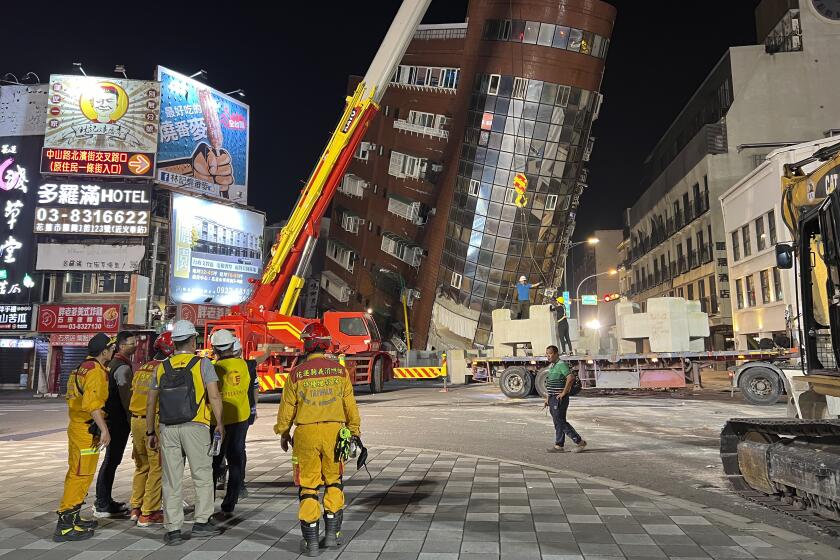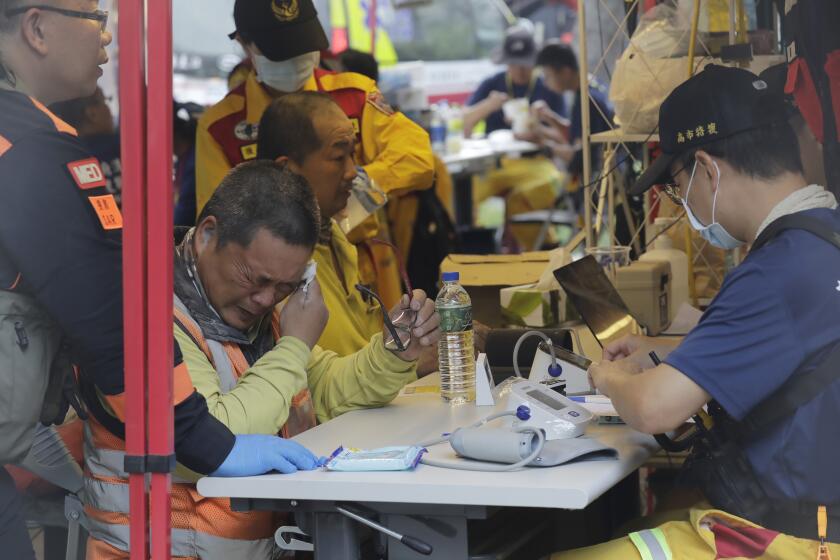The world holds its breath when there’s an earthquake in Taiwan. This company is why

A magnitude 7.4 earthquake shook Taiwan Wednesday, killing nine people, injuring thousands more and causing landslides and infrastructure damage across the island.
It’s not surprising that there was an eruption of concern from around the world, given the quake was Taiwan’s worst in a quarter century. But I can’t remember anyone mentioning the last one, a magnitude 7.6 earthquake in 1999 that killed more than 2,000 people and cleaved the pavement outside of my uncle’s 7-Eleven store in Taichung. Taiwan had such a low profile then that when I told people my family is from Taiwan, most just assumed I was mispronouncing Thailand.
What’s different now? It has a lot to do with the Taiwan Semiconductor Manufacturing Co., which produces more than a third of the world’s computational power every year, according to the book “Chip Wars: The Fight for the World’s Most Critical Technology.”
Taiwan is regularly jolted by quakes and its population is among the best prepared, but authorities said they expected a mild earthquake and did not send alerts.
TSMC is the most advanced, efficient producer of what are arguably the world’s most valuable resource: computer chips. Every product, service or good that uses computers or the internet relies on chip production, and that includes the world’s militaries. Even a small interruption in the Taiwanese company’s operations could cause economic and geopolitical shocks across the world.
The world now holds its breath if Taiwan trends on social media. Politicians from both the right and left are scheduling official visits to Taiwan to show their support for democracy, most recently a congressional delegation led by Mike Gallagher (R-Wis.) in February. Journalists from all over the world closely followed Taiwan’s presidential election, calling it an event that could reshape global politics.
National security analysts are drawing up battle scenarios for a possible war between the U.S. and China over Taiwan, counting up the ships, missiles and bombs on either side. And with the U.S. presidential election season heating up, it will become important for us all to educate ourselves about Taiwan.
I don’t doubt that the world’s concern for Taiwan’s democracy and people is genuine. But it is at least matched by concern for Taiwan’s chip foundries, where even a small interruption in operation could seriously disrupt global supply chains.
Thankfully, Reuters reported Thursday that the chip manufacturer suffered little serious damage in the quake. After the earthquake struck off the coast of Taiwan’s Hualien County Wednesday morning, TSMC briefly evacuated some of its workers from its factory in Hsinchu, more than 100 miles from the epicenter. They returned to work after a few hours. But even that short disruption could cost the company up to $60 million in revenue along with further losses down the line for companies relying on TSMC’s chips, according to a Barclays investor report Wednesday.
TMSC’s main chip foundries are a little more than a mile from my late grandma’s house in Hsinchu. The company is notoriously media-shy, but it offers an on-site museum for the curious. When I was visiting relatives in February, I paid a visit to see what I could learn.
It turns out, not much. The museum consists of four rooms with various interactive touch screens and audio presentations and focuses primarily on explaining the technology and history of semiconductor chips. It was like walking through a high-tech science textbook.
Some 200 residents near the epicenter were staying in temporary shelters as the main road linking the affected area to the capital, Taipei, was still closed.
The museum was housed on a plain business campus with none of the ostentation and branding excess of American tech campuses. National security analysts call TSMC the most important company in the world, but it looks awfully similar to an Encino office park.
That modesty serves a strategic purpose, according to Raymond Kuo, who analyzes U.S.-China security issues for the Rand Corp. with a focus on Taiwan.
TSMC grew to a position of dominance in semiconductor manufacturing by staying out of the spotlight, Kuo said. The company doesn’t design any chips of its own and thus does not compete with any of its customers, which include Intel, Apple, Sony, Dell and Hewlett-Packard.
And in Taiwan, highly qualified engineers and scientists accept relatively lower Taiwanese salaries because they see a job at TSMC as a higher calling, which helps keep labor costs low and factories running at all hours. The company’s role in keeping the island safe is widely acknowledged — President Tsai Ing-wen called the company Taiwan’s “silicon shield.”
“Part of what distinguishes TSMC from its competitors is not its technology, but the organization,” Kuo said. “If a machine breaks down at 5 a.m., they’ve three shifts of people with master’s degrees to keep them running constantly.”
An invading country cannot easily seize chip manufacturing as a prize of war, such as oil rigs or mines, Kuo said. A war risks damaging the machines, which themselves cost hundreds of millions of dollars, beyond repair. Operating them effectively takes decades of expertise. Chip fabrication requires huge investments and government coordination of technological resources, not unlike the depiction of the race to create the atomic bomb in the film “Oppenheimer.”
World governments have spent the last three decades racing to capture the exploding market for computing power and block political enemies from obtaining the advanced chips used to wage war. For countries in that race, TSMC, and by extension, Taiwan, represents a winning hand.
In 2022, the Biden administration restricted the export of American chip technology to China and banned U.S. residents, citizens and green card holders from working in Chinese chip firms. The move represents an existential threat to the Chinese semiconductor sector, which relies on American-designed chips from TSMC.
But the effort to strangle China’s chipmakers actually makes Taiwan more valuable to China’s leaders, especially as they confront an unprecedented economic downturn.
Wednesday’s earthquake showed that Taiwan can prepare for disaster. After 1999, planners drew up strict retrofitting requirements and blanketed the island with a dense network of warning systems. The quake stopped traffic all over Taiwan, but with far less death and damage compared with 25 years ago.
TSMC facilities recovered most of their capacity by the next day, and after the company told its investors that it would still meet its revenue projections for the year, stocks were up 3% Thursday morning.
But there are no chips or computerized warning systems sophisticated enough to predict Taiwan’s biggest threat: a deepening political and economic rivalry between the United States and China that threatens to enfold the entire world.
Not yet, anyway.
More to Read
Sign up for Essential California
The most important California stories and recommendations in your inbox every morning.
You may occasionally receive promotional content from the Los Angeles Times.












